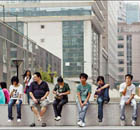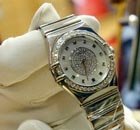Society
Commuters have mixed response to new safety measures
By Wei Tian (China Daily)
Updated: 2010-03-22 08:49
 |
Large Medium Small |
SHANGHAI - With just over one month left before the Expo, security checks have been introduced on Shanghai's buses and subway lines, with over 500 X-ray machines and 3,000 safety inspectors guarding the city's public transportation system.
A pilot scheme launched earlier this year to install X-ray machines at 43 of the city's subway stations will now be expanded to all 280 stations. Regular safety checks will be carried out on buses and delivery trucks.
Although the new measures are still being implemented, the public is already expressing concern.
"Requiring passengers to scan their bags will surely slow down the flow of traffic," said Jethro Keen, 40, from the United Kingdom. "This could be a big hassle when it comes to peak hours."
About 3,000 assistant inspectors wearing yellow vests have been assigned to help speed things up. Passengers are also advised to preplan their trips to avoid delays.
Flammable liquids and tool kits are also being more carefully monitored, while drinks are restricted at subway stations.
"Passengers have different personal needs, so there should be a degree of flexibility," said 24-year-old Li Wenfei, who was unhappy with the new restriction on carrying alcohol on the subway.
Local authorities said the measures would be based on a "flexible and humanitarian" approach.
"We will allow up to four to five bottles per passenger," said an inspector at Jing An Temple station. "As for sharp tools, we advise people to wrap them with cloth or tape."
Since trial runs began on Jan 1, over 40 million pieces of luggage have been X-rayed and 1 million opened and checked. Of these, 30,000 pieces were identified as containing dangerous goods.
During the Beijing Olympic Games in 2008, 250,000 inspectors patrolled the city's bus routes.
"It was a little annoying to have the inspectors looking at what was inside our bags," said 23-year-old Wang Fan, recalling the summer she spent in Beijing in 2008. "Whenever I spotted a security guard I always took a detour as fast as I could."
Six bus routes leading to Expo Garden have been equipped with handheld scanners and first-aid kits.
Security checks at entrances and exits to underground car parks and warehouses will be effective immediately, said organizers, adding that they are still open to suggestions to fine-tune the measures.
"I understand these measures are good for (China's) international reputation, and they should be put into practice at major transportation centers. But I just don't think it's necessary at minor stations," said the UK's Keen.
"In principle this is a very good idea, but the details should be adjusted on a case-by-case basis."












